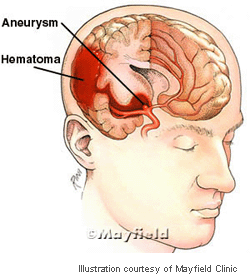 |
| Credit: www.cognosci.com |
Quitting reduces risk of burst
aneurysm
Smoking
greatly increases the risk of potentially fatal brain bleeding caused by a
burst aneurysm, a new study warns.
An
aneurysm is a bulge in a weakened artery. If an aneurysm bursts, blood leaks
into the brain. The chances of surviving a burst aneurysm are about 50 percent,
and survivors often have lifelong disabilities.
Researchers
compared 426 people in South Korea who suffered brain bleeds between 2002 and
2004 with 426 people who did not have a brain bleed. The participants' average
age was 50.
The
brain bleed group had a larger number of smokers and people with a family
history of stroke and high blood pressure. Slightly less than 38 percent of
those who had a brain bleed were current smokers, compared with a little more
than 24 percent in the comparison group.
After
accounting for other factors such as weight, salt intake and family history of
diabetes, the researchers found that smokers were nearly three times more
likely to have a brain bleed than nonsmokers. The longer and more heavily a
person smoked, the greater their risk for a brain bleed.
Overall,
quitting smoking reduced the risk of a brain bleed by 59 percent after five
years or more, reducing the risk to the level of nonsmokers. However, former
heavy smokers (20 or more cigarettes a day) were still more than twice as
likely to have a brain bleed as people who had never smoked.
Smoking
causes short-term effects such as thickening of the blood and increased blood
pressure, both of which increase the risk of a brain bleed. These effects can
be reversed by stopping smoking, explained Dr. Chi Kyung Kim, of Seoul National
University Hospital's neurology department, and colleagues.
But
smoking also causes permanent changes in the structure of artery walls, and
these changes may be greater in heavy smokers, the authors said in a journal
news release.
The
study revealed a link between smoking and the risk of a brain bleed, but it did
not prove cause and effect.
###
This
study has been published online Aug. 30 in the Journal of Neurology,
Neurosurgery and Psychiatry:
Kim
CK, Kim BJ, Ryu W, Lee S, Yoon B. Impact
of smoking cessation on the risk of subarachnoid haemorrhage: a nationwide
multicentre case control study. J
Neurol Neurosurg Psychiatry doi:10.1136/jnnp-2012-302538
More
information
The
U.S. National Institute of Neurological Disorders and Stroke has more about brain aneurysm.


No comments:
Post a Comment